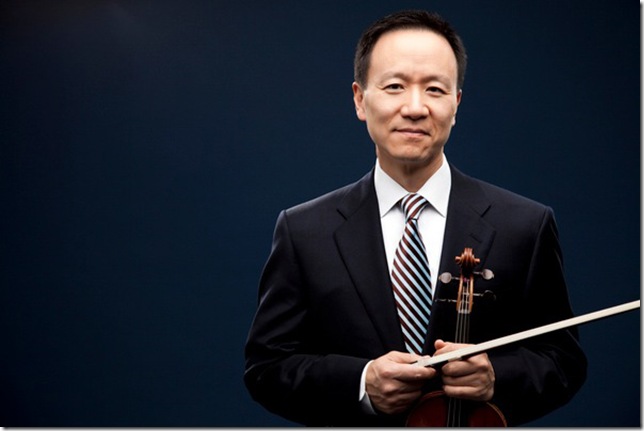In the 10th year of its existence, the group now known as The Symphonia Boca Raton has begun to branch out, playing concerts other than their usual Sunday afternoons at the Roberts Theatre and their appearances as the house band at the Festival of the Arts Boca.
Saturday night, the group inaugurated what its hopes to be a regular series at All Saints Episcopal Church in Fort Lauderdale with an all-strings Baroque evening led by David Kim, concertmaster of the Philadelphia Orchestra. The central work on the program was The Four Seasons of Vivaldi, probably the most popular classical composition in the world, but those four works got a good run for their money from a reading of the Double Concerto of J.S. Bach, in which Kim was joined by violinist Mei Mei Luo.
Kim proved to be a genial host as well as exemplary violinist, talking about the music to the sizable house in patient fashion, and even showing off the iPad and page-turning pedal he was using to read his music. And he led his Symphonia colleagues admirably as well, drawing generally excellent ensemble from the players and infusing the proceedings with real enthusiasm.
The Bach was the most high-powered of the pieces, getting a forceful, driving performance from the orchestra, Kim and Luo. A founding member of the Delray String Quartet and a well-known local musician, Luo is at her best in aggressive music like this, and her full-throated style was an ideal foil to Kim’s no less energetic but more tightly controlled playing.
Kim and the orchestra chose a headlong, speedy tempo for the opening movement, and in the spacious acoustic of All Saints the music sounded fresh and abundant. There was the slightest of unsynchronies at the outset, but other than that, soloists and orchestra were a chugging, humming unit, and audience heads could be seen bouncing along. The same was true of the third movement, which if a little slower also was just as powerful; it’s not for nothing that Kim called it “the first rock ‘n’ roll” right after the audience jumped to its collective feet at the end.
The slow movement, which Kim said had been part of the music for his own wedding ceremony, was played beautifully, with Luo and Kim making the most of the long-breathed aria, a music that seemingly never ends. Here, too, the different styles of the two could be clearly heard, with Luo adding a very Romantic vibrato and Kim again bringing focus and inner intensity to his playing. The orchestra accompanied with impressive softness, a laudable dynamic contrast that was to obtain all through the Vivaldi as well.
Kim explained the action of the four sonnets that accompany the Four Seasons — which is one of the first programmatic pieces in the literature — in engaging fashion before embarking on the concertos. It’s worth noting that this music was highly popular in its day (it was published in 1725), and it has lost none of its appeal in the three centuries since.
Saturday night’s performance showed us why, with brilliant solo playing by Kim and sensitive, committed collaboration from the Symphonia. In the Spring concerto, Kim’s triplets in the “lightning” section of the first movement were gratifyingly accurate, and his soulful, hushed playing of the slow movement, over a remarkably quiet Symphonia, was deeply beautiful.
And there was admirable unity in the Summer concerto, which calls frequently for all the strings to play blizzards of notes in unison, while in the slow movement, all the players did a good job of portraying the inertness that goes with a day that’s simply too hot for anyone to get much done. Collaboration, and dynamics, between soloist and orchestra in the Autumn concerto were particularly good, with the continual handoff of flourishes from the players to Kim going without a hitch.
The Winter concerto, in several ways the most remarkable of the set, got a terrific reading, with vigorous ensemble and splendid solo work in the first movement, a gorgeous performance of the lovely song that is the second movement, and again, excellent unity from all concerned in the finale. The audience shouted its acclaim as they stood, and surely would have been glad to hear more.
The concert opened with the so-called Christmas Concerto (Concerto Grosso in G minor, Op. 6, No. 8) of the Italian violin virtuoso and composer Arcangelo Corelli. Subtitled “Fatto per la notte di Natale” (Written for Christmas night), and published in 1714, it is best-known for its closing movement, a serene pastorale.
Kim was accompanied at second violin by Dale Sandvold, and led the music with a careful, precise hand. Both soloists played well, and there was good accompaniment work also from cellist Christopher Glansdorp in the early moments. The concerto’s final, quiet bars were pinpoint-accurate, giving the audience a taste of the quality of ensemble coherence and attention to dynamic contrast that would distinguish the whole evening.
Symphonia officials said afterward that an all-Baroque evening may be a feature of orchestra seasons going forward, and indeed it is remarkable how life-affirming and invigorating these 300-year-old pieces are. There’s something about their timelessness and their ability to lift the spirit that make them ideal for a festive season and for the positive outlook we all want to bring to the new year.
The Symphonia Boca Raton, led by David Kim, repeats this concert today at 3 p.m. at the Roberts Theater on the campus of St. Andrew’s School in Boca Raton. Tickets range from $45-$75. Call 1-866-687-4201 or visit www.bcoasymphonia.org.
